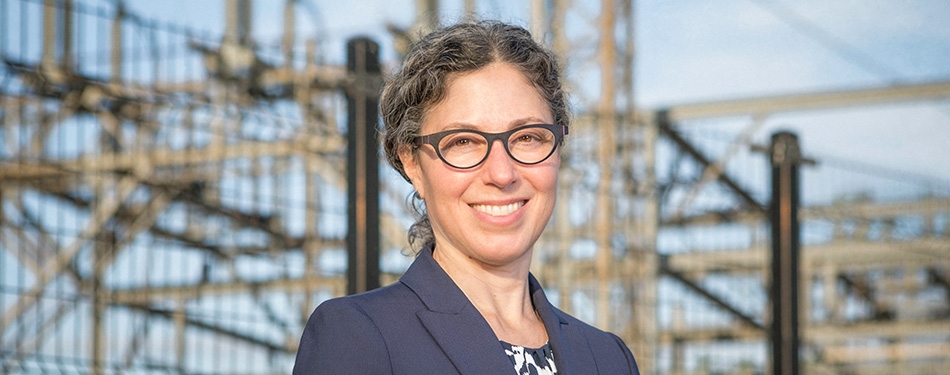Alexandra Klass, an expert on energy regulation, to join Michigan Law after Department of Energy appointment.
The threat of global climate change has made the transition to renewable energy imperative, and as technology advances and the cost of wind and solar energy drops, the green revolution is picking up steam.
But for the United States to truly achieve a future free from fossil fuels, we will also need to build a regulatory system that’s more favorable to incorporating these newer forms of power generation into the electrical grid.
It’s a thorny legal issue—and one to which Alexandra Klass, who is joining Michigan Law as the James G. Degnan Professor of Law, has dedicated much of her career.
She will join the Michigan Law faculty following her current appointment as deputy general counsel for energy efficiency and clean energy demonstrations at the U.S. Department of Energy.
Almost no one could have anticipated that the cost of wind and solar would have dropped as much as it has…We have all these technologies now that we must deploy more widely.
“Just as a result of economics and history, we have very different legal regimes that govern different types of energy transport infrastructure,” Klass said.
Permitting for interstate natural gas pipelines, for example, is managed by the Federal Energy Regulatory Commission, which creates a more streamlined, national process.
Oil pipelines and electric transmission lines, on the other hand, are almost exclusively regulated at the state level. “So if you have a multi-state electrical transmission line,” Klass explained, “you need separate permit approvals and separate eminent domain authorizations from each of those states, sometimes even individual counties.”
Bringing state and local authority to renewable energy regulation
Renewable energy is both more diffuse than traditional power generation—compare the wind turbines scattered throughout Michigan’s Thumb to a single large coal plant situated conveniently near a population center—and less evenly distributed throughout the country, with concentrations of wind in the Midwest and Plains states and solar power in the desert Southwest.
That means that in order to compete with fossil fuels, renewables require a rapid expansion of the electrical grid—but the current regulatory system makes that a slow and difficult process.
Klass’s scholarship over the past decade has focused in large part on breaking down permitting barriers to greater integration of renewable energy into the electric grid.
In this work, she has urged that appropriately streamlining this process is critical to bring the cost of electricity down, increase reliability and resilience, and have a cleaner electric grid—not just to generate electricity, but also to power our vehicles and heat our homes as we transition to electrification.
Klass, who has spent the past decade and a half on the faculty at the University of Minnesota Law School, has researched ways that the federal and state governments might use their existing authority in innovative ways to facilitate expanding the electric grid, as well as to accommodate electric vehicle charging, rooftop solar, and other green technologies.
She has also published scholarship on how we can ensure more even distribution of the costs and benefits of energy infrastructure—in the fossil fuel era, she noted, disadvantaged communities have disproportionately suffered the downsides of power generation and highway expansion, including pollution and seizure of land by eminent domain.
From academia to the federal government and back again
Although Klass’s recent focus has been primarily academic, she also has ten years of experience in private practice, including as a partner at Dorsey & Whitney LLP in Minneapolis.
But this year, the Biden-Harris administration asked her to join its team at the U.S. Department of Energy.
As deputy general counsel for energy efficiency and clean energy demonstrations, she is providing legal support for the department’s efforts to improve efficiency standards for appliances and energy technologies, and to fund clean energy demonstration projects, including clean hydrogen, energy storage, electric grid upgrades, and carbon capture sequestration projects.
“It’s really exciting work,” Klass said.
Although Klass’s government service will delay her arrival in Ann Arbor, the former U-M varsity gymnast, who graduated with a bachelor’s degree in political science and French, is excited to rejoin the Michigan community.
“I have fond memories of my time at Michigan, and I’m really looking forward to working with so many talented scholars and teachers,” she said.
She noted the potential for future collaboration not only with her new colleagues at Michigan Law but also across campus, at the School for Environment and Sustainability, the Graham Sustainability Institute, the Ford School of Public Policy, and the Ross School of Business, among others.
“Meanwhile, I anticipate I’m going to learn a huge amount through my federal service work, which will help inform both my teaching and scholarship when I actually arrive on campus.”
People who dedicate their careers to the environment often find reason to despair, but Klass is optimistic.
“We have a lot of challenges, but we’ve also come a long way in the last 50 years,” she said. “I think almost no one could have anticipated that the cost of wind and solar would have dropped as much as it has, and that in places like the upper Midwest and Texas you’d have such a high percentage of electricity already being generated from wind and solar energy. We have all these technologies now that we must deploy more widely.”
—Amy Crawford

